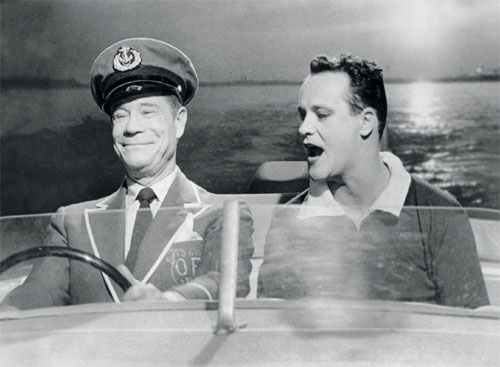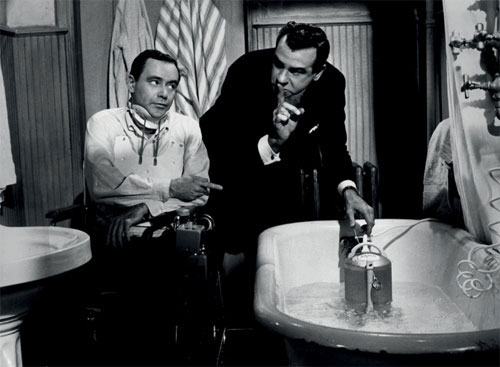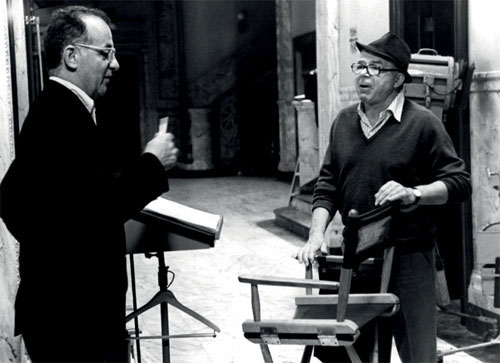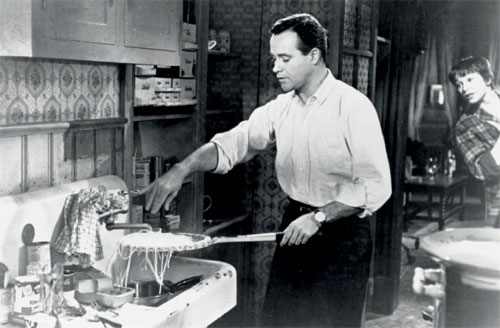LEGACY
![]()
Billy Wilder & I.A.L. Diamond
“‘I always collaborated with somebody,’ he said in the late 1990s after his career was over. ‘If you think that I am speaking lousy English now, you should have heard it then. I felt I had to have a collaborator [because of language].’”
Born in 1906, filmmaker Billy Wilder won six Oscars, along with an Irving G. Thalberg Memorial Award, but his wonderful movies weren’t the product of his fruitful imagination alone. “I always collaborated with somebody,” he said in the late 1990s after his career was over. “If you think that I am speaking lousy English now, you should have heard it then. I felt I had to have a collaborator [because of language].” Growing up in Vienna and working on films in Europe before moving to America in his late twenties, Wilder found superb collaborators when he began making Hollywood movies, including Raymond Chandler on Double Indemnity (1944) and Charles Brackett on The Lost Weekend (1945) and Sunset Boulevard (1950). But with all due respect to those two fine writers, Wilder’s greatest partnership may have been with I.A.L. Diamond.
Born in 1920 in Austria-Hungary (now Moldova), Diamond moved to Brooklyn with his family when he was nine. Before teaming up with Wilder, he spent over a decade writing scripts, including Monkey Business (1952), which he co-wrote with Ben Hecht and Charles Lederer, and starred Cary Grant, Ginger Rogers, and Marilyn Monroe. His partnership with Wilder began with Love in the Afternoon (1957), but their first masterpiece came two years later with Some Like it Hot (1959), the celebrated comedy that brought together Tony Curtis and Jack Lemmon as 1920s musicians disguised as women and on the run from the mob. Beyond all its other attributes, the movie is forever remembered for its terrific final line. Lemmon explains to fiancé Joe E. Brown that he can’t marry him because he’s actually a man, to which Brown matter-of-factly responds, “Well, nobody’s perfect.” It was all Diamond’s idea. Years later, Wilder recalled that Diamond had suggested it for the final line and that Wilder had decided to stick with it until they could come up with something better. They never did—but it turned out to be just right. “The audience just exploded at the preview in Westwood … And it wound up being our funniest last line,” Wilder said.
Their hot streak continued with the next film. A sublime mixture of romance, comedy, and drama, The Apartment (1960) won five Oscars, including Best Picture. Wilder had the idea for the film after watching David Lean’s Brief Encounter (1945), which was about an affair between a married man and a married woman. But it wasn’t until Wilder and Diamond heard a news story about a woman’s husband who killed his wife’s clandestine lover that they figured out the plot. “The interesting thing was that [the lover] was using the apartment of one of the underlings at [his] agency,” Diamond recalled. “That was what gave us the relationship—somebody who was using somebody lower than he in a big company, using his apartment.”
The two men continued to collaborate over the next two decades on hits like Irma La Douce (1963) and superb comedies such as The Fortune Cookie (1966). Together, they were nominated for three writing Oscars, and won one for The Apartment. And while Wilder had worked with several writing partners, it was clear that Diamond was someone very special to him. “If I ever lost this guy,” Wilder claimed, “I’d feel like Abercrombie without Fitch.” That moment came April 21, 1988, when Diamond died of multiple myeloma at the age of 67. Their final onscreen pairing was 1981’s Buddy Buddy, and true to his word, Wilder effectively retired after that. “I wanted to quit when I was 80,” Wilder said. “I quit when I was 82.”
Wilder lived 14 more years, dying at the age of 95 in March 2002. He continues to inspire new filmmakers. When director Michel Hazanavicius accepted the Best Picture Oscar for The Artist in 2012, he concluded his comments with “I want to thank three persons—I want to thank Billy Wilder, I want to thank Billy Wilder, and I want to thank Billy Wilder.” Wilder is buried in Pierce Brothers Westwood Village Memorial Park, and his tombstone is further testament of his eternal connection to Diamond. “I’m A Writer,” his grave reads, “But Then Nobody’s Perfect.”
The plot of The Fortune Cookie (1966) centers on a crooked lawyer (Walter Matthau) who convinces his brother-in-law (Jack Lemmon) to fake a serious injury for profit
I.A.L. Diamond (left) and Billy Wilder (right) on the set of The Front Page (1974), a witty newspaper caper starring Jack Lemmon and Walter Matthau




